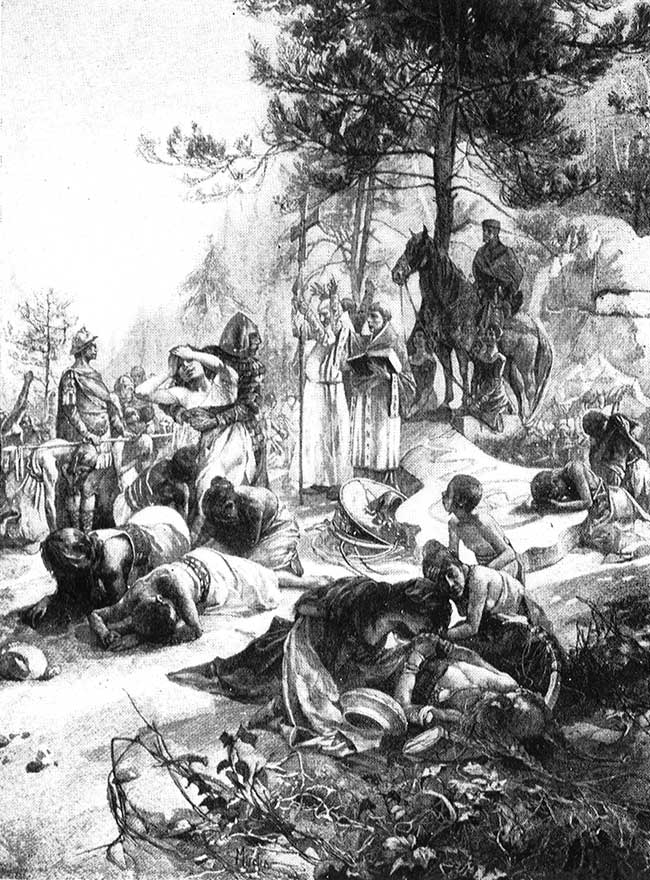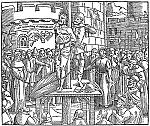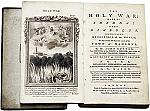Severe salvation

[Forced baptism of Saxons, after a painting by Mucha, from, John Lord's Beacon lights of history. New York: James Clarke, 1886. Public domain.]
In CH #63 we interviewed historian Richard Fletcher about the history of forced conversions. “It is not a pleasant aspect of our heritage,” our editors wrote, “but one that nonetheless teaches us a great deal about human nature and what, in fact, solidifies Christian faith.” This interview continues to generate discussion online, displaying one way CH seeks to acknowledge the church’s whole story.
CH: When did Christians first begin to use force to convert people?
RF: Soon after Constantine’s conversion, though the first use of force was not designed to convert pagans but to correct dissident Christians. Bishop Augustine faced a dissident sect, the Donatists. He agonized about using coercion to bring them back to the orthodox fold. Eventually he decided it was permissible, thanks to his reading of the parable of the great banquet (Luke 14:16–24).
It isn’t until Charlemagne’s kingdom in the eighth century that we see force used to coerce [pagan] conversions, specifically against the Saxons.
CH: Why did Charlemagne move in this direction?
RF: First, the concept of Christian kingship had developed the previous century, and the duty of expanding Christendom, if necessary by force, became part of a king’s duty.
Second, an advisor at the highest levels of Charlemagne’s government pushed this particular policy: a man named Lull, of Anglo-Saxon origin, who became archbishop of Mainz. Nothing had worked to convert the Saxons, and in essence he said, “These stubborn people will never convert on their own. We’ve got to force them to submit.”
Not all the king’s advisors supported this policy. Another Englishman at court, Alcuin (c. 740–804), had grave doubts. In the 790s, when the Franks conquered the Avars on the eastern frontier (in modern Hungary), Alcuin wrote to Charlemagne, saying essentially, “Don’t make the same mistakes you made with the Saxons. You can’t force Christianity upon people.” We see some signs that Alcuin’s advice was heeded.
CH: Were forced conversions successful?
RF: Yes and no. The problem is semantic. The definition of conversion has changed over the centuries.
Charlemagne or Olaf Trygvesson would have said, “I defeat my enemies, and a priest then sprinkles water over them and says some words in Latin, and they become Christians. They’ve been converted.” Today we don’t regard that as conversion—nor would some early medieval people, like the Venerable Bede (c. 673–735) or Alcuin.
Nonetheless, because of coercive kings, Christianization was possible in a way it hadn’t been before.
CH: Medieval pagans seemed more willing to submit to forced conversions than Christians under similar circumstances. Why?
RF: Medieval European pagans had many gods and thought they could just add Christ to their existing pantheon. The exclusive claims of a monotheistic faith didn’t sink in at first. Even after “conversion” ideas about gods and goddesses, spirits and fairies, elves and goblins coexisted with faith in Christ.
Also pagans were impressed with Christendom’s sheer material power. The Christian God was obviously one who could deliver the goods. Many pagans were not adverse to converting to Christianity because they believed it would give them more material prosperity than their gods had. To appreciate this point, note how Christian missionaries fared in sixteenth-century China. Here was a non-Christian culture that was in many ways superior to the West. In that context Christianity made practically no headway.
CH: Despite conversions for less-than-pure motives, Christianity seems to “stick” in later generations. Why?
RF: Christian teaching took place after the formal acceptance of Christianity. One may point out the abuses of the medieval church, even in what it taught, but it did a good job at instilling knowledge of Christianity into people who had been pagan for centuries.
CH: Today using force to convert is unthinkable. Why did this idea pass away?
RF: My hunch is that it’s due to the rise of Protestant evangelical movements, especially the Great Awakening. We see a new stress placed upon the individual soul and upon religious experience. Conversion becomes a voluntary, individual turning to God. Once you have that, the idea of forcing someone to convert becomes absurd. CH
By Richard Fletcher
[Christian History originally published this article in Christian History Issue #150 in 2024]
Richard Fletcher (1944–2005) was a professor of history at the University of York, England.Next articles
Moments that mattered
Issues that stood out to previous editors and contributors.
Elesha Coffman, Bill Curtis, David Neff, Jennifer Woodruff Tait,A life of luxury meets the life of Christ
The lives of Christ and the saints filled Ignatius with a sense of “consolation.”
Katie M. BenjaminJohns worth knowing
A persecuted preacher, an innovative evangelist, and an "old African blasphemer"
E. Beatrice Batson, J. D. Walsh, Aubrynn WhittedSupport us
Christian History Institute (CHI) is a non-profit Pennsylvania corporation founded in 1982. Your donations support the continuation of this ministry
Donate







